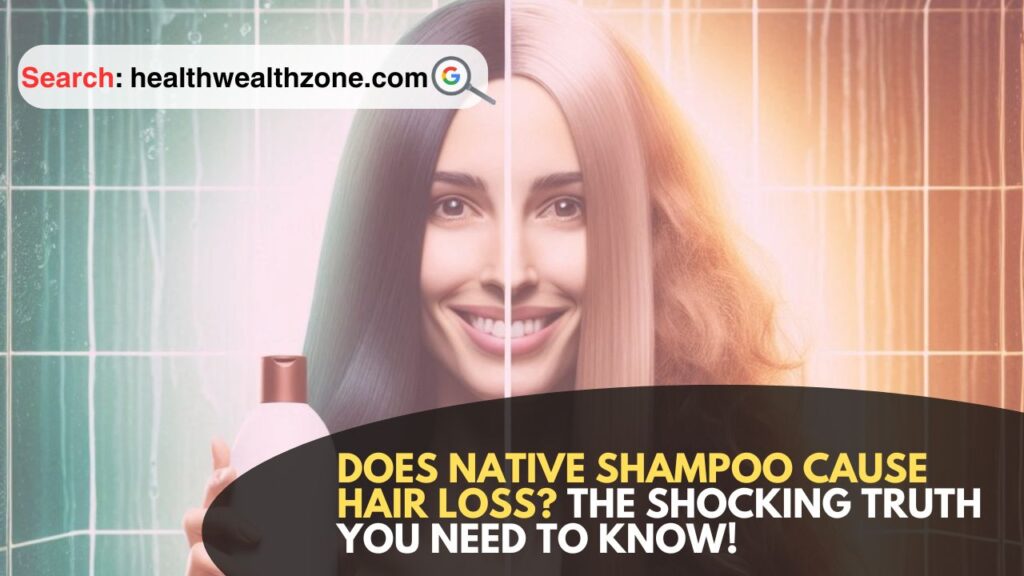Does Native Shampoo Cause Hair Loss?: Hair care is a critical part of personal grooming, and shampoos are at the forefront of that routine. One of the most popular options on the market today is “Native Shampoo,” touted for its natural ingredients and clean formula. However, some users have raised concerns about potential hair loss associated with its use. So, does Native Shampoo actually cause hair loss? Let’s dive deep into this topic to uncover the truth.

👉 Don’t Wait — Order HairFortin from the Official Site Today
Understanding Native Shampoo
Native Shampoo is a product marketed as a natural, sulfate-free, and paraben-free hair care solution. It is designed for individuals seeking a cleaner, more eco-friendly alternative to conventional shampoos. Here are some key highlights about Native Shampoo:
- Natural Ingredients: Native Shampoo is free from harsh chemicals, sulfates, parabens, and silicones. It incorporates natural extracts and essential oils.
- Diverse Options: The brand offers various formulas targeting different hair types, including dry, oily, and damaged hair.
- Eco-Friendly Packaging: The product comes in sustainable packaging to minimize environmental impact.
- Fragrance Options: Native provides a wide range of unique scents, as well as unscented options for sensitive users.
Despite its popularity, questions remain about whether Native Shampoo might contribute to hair loss.
👉 Don’t Wait — Order HairFortin from the Official Site Today
Common Causes of Hair Loss
Before diving into Native Shampoo specifically, it’s essential to understand the general causes of hair loss. Hair shedding is a natural process, but excessive hair loss may indicate underlying issues. Common factors include:
1. Hormonal Changes
- Conditions like pregnancy, menopause, or hormonal imbalances can cause hair thinning.
2. Genetics
- Androgenic alopecia, or pattern baldness, is hereditary and a common cause of hair loss.
3. Medical Conditions
- Conditions such as alopecia areata, thyroid disorders, and scalp infections can lead to hair loss.
4. Nutritional Deficiencies
- A lack of essential nutrients like iron, biotin, and protein can weaken hair.
5. Stress
- Physical or emotional stress can trigger temporary hair shedding known as telogen effluvium.
6. Hair Care Practices
- Overuse of heat styling tools, chemical treatments, or harsh shampoos can damage hair and scalp health.
Does Native Shampoo Cause Hair Loss?
Analyzing the Ingredients
The ingredients in a shampoo play a significant role in determining its impact on hair health. Let’s break down some of the common components in Native Shampoo:
1. Sulfate-Free Formulas
- Pros: Sulfates are harsh detergents that can strip natural oils from the scalp, leading to dryness and irritation. Native Shampoo’s sulfate-free formula is gentler on the scalp.
- Cons: For some users, the lack of sulfates may result in inadequate cleansing, leaving residue that could potentially clog hair follicles.
2. Essential Oils
- Pros: Essential oils like tea tree, peppermint, or eucalyptus have antimicrobial properties and can improve scalp health.
- Cons: Essential oils may cause irritation or allergic reactions in sensitive individuals, leading to hair fall.
3. Plant-Based Extracts
- Pros: Ingredients like aloe vera, coconut oil, and shea butter are nourishing and hydrating.
- Cons: Build-up from overly moisturizing ingredients can weigh down hair, causing it to break easily.
User Experiences
Online reviews of Native Shampoo reveal mixed opinions:
- Positive Feedback: Many users praise its gentle formula, pleasant scent, and effectiveness in reducing scalp irritation.
- Negative Feedback: Some users report increased hair shedding, though it’s unclear if the shampoo is the direct cause or if other factors are at play.
Scientific Perspective
No scientific evidence directly links Native Shampoo to hair loss. However, individual reactions to ingredients or improper usage may contribute to perceived issues.
How to Determine If a Shampoo is Causing Hair Loss
If you suspect your shampoo is causing hair loss, consider the following steps:
1. Examine Your Hair Care Routine
- Are you using additional products that might irritate the scalp?
- Are you washing your hair too frequently or infrequently?
2. Patch Test the Product
- Apply a small amount of shampoo to your inner arm to check for allergic reactions before using it on your scalp.
3. Monitor Changes
- Keep track of how your hair responds after switching shampoos. Note changes in texture, volume, or shedding.
4. Consult a Dermatologist
- If hair loss persists, seek professional advice to rule out underlying conditions.


Preventing Hair Loss: Best Practices
Here are some tips to maintain healthy hair and prevent hair loss:
- Choose the Right Shampoo: Select a formula suited to your hair type and needs.
- Avoid Overwashing: Washing hair too often can strip natural oils, leading to dryness.
- Limit Heat Styling: Use heat tools sparingly and always apply a heat protectant.
- Maintain a Balanced Diet: Ensure your diet includes vitamins and minerals essential for hair health.
- Reduce Stress: Practice stress management techniques like yoga, meditation, or exercise.
- Handle Hair Gently: Avoid harsh brushing and opt for a wide-tooth comb.
Table: Comparison of Native Shampoo vs. Traditional Shampoos
| Feature | Native Shampoo | Traditional Shampoos |
| Key Ingredients | Natural, sulfate-free, paraben-free | May contain sulfates, parabens, and silicones |
| Scalp Irritation | Less likely due to gentle formula | Higher risk due to harsh chemicals |
| Environmental Impact | Eco-friendly packaging | Often uses non-recyclable packaging |
| Hair Types | Suitable for most hair types | May vary widely by product |
| Fragrance | Essential oils or unscented options | Synthetic fragrances |
FAQs
1. Can shampoo alone cause significant hair loss?
Not typically. Hair loss is usually caused by a combination of factors, including genetics, health conditions, and improper hair care practices.
2. Is it safe to use Native Shampoo daily?
Yes, but washing hair daily can strip natural oils. For most hair types, washing 2-3 times a week is sufficient.
3. What should I do if I experience hair loss with Native Shampoo?
Stop using the product and monitor your hair for changes. If hair loss persists, consult a dermatologist.
4. Are natural shampoos better for hair?
Natural shampoos can be gentler and safer for sensitive scalps, but effectiveness varies by individual.
5. Does switching shampoos frequently cause hair loss?
Switching shampoos is unlikely to cause hair loss unless you’re using a product that irritates your scalp.
👉 Don’t Wait — Order HairFortin from the Official Site Today
Key Takeaways
- No Conclusive Evidence: There’s no scientific proof that Native Shampoo causes hair loss, but individual reactions may vary.
- Understand Your Hair Needs: Choose a shampoo tailored to your specific hair type and concerns.
- Monitor Results: Pay attention to how your hair reacts to any new product.
- Consult Experts: Seek professional advice if hair loss becomes persistent or severe.
Native Shampoo’s natural and gentle formula makes it a promising choice for many, but like any product, it may not work for everyone. By understanding the potential causes of hair loss and adopting healthy hair care practices, you can make informed decisions to keep your locks thriving.
👉 Don’t Wait — Order HairFortin from the Official Site Today
